Imagine a world where a young person's dream of a dignified life feels out of reach. Millions of young Indians face this harsh reality, lacking the skills and guidance to navigate the ever-changing job market. But what if there was a program that empowered them to bridge this gap and write a new story?
The answer lies in initiatives like the Magic Bus India Foundation's Livelihood Programme. It is more than just a skilling initiative. It's a story of transformation, equipping underprivileged youth with the tools they need to not only secure jobs but thrive in their careers.
Let's delve deeper and discover how Magic Bus is paving the way for a brighter future.
Empowering Young Minds for a Brighter Tomorrow
 Magic Bus India Foundation is one of the leading NGOs in the education and skilling space in India. Over 25 years, the organisation has established its presence across 24 states and Union Territories of India. Magic Bus works with young people from underserved communities between the age group of 12 to 25 years, providing them with life skills and employability skills. The NGO offers two distinct life skills programmes – the Adolescent programme and Livelihood Programme.
Magic Bus India Foundation is one of the leading NGOs in the education and skilling space in India. Over 25 years, the organisation has established its presence across 24 states and Union Territories of India. Magic Bus works with young people from underserved communities between the age group of 12 to 25 years, providing them with life skills and employability skills. The NGO offers two distinct life skills programmes – the Adolescent programme and Livelihood Programme.
The Adolescent Programme is designed to empower adolescents aged 12 to 18 years with life skills and education enhancement, ensuring they complete their secondary education. The organisation has established an impressive network of 342 Community Learning Centres (CLCs) and has partnered with 6 state governments and 2 district-level governments to impart life skills education in government schools. On the other hand, the Livelihood Programme caters to youth between 18 to 25 years, equipping them with transferable life and employability skills and preparing them for the dynamic job market. Notably, this programme boasts a commendable 56% participation rate among girls, underscoring Magic Bus’s commitment to building agency and empowering women to make significant contributions to their families and communities. Additionally, this programme also supports aspiring entrepreneurs from underserved communities to launch and manage micro-enterprises to combat unemployment.
Mission: To equip vulnerable young people with life skills that enable them to thrive in the transition to adulthood.
The Initiative
Magic Bus India Foundation’s Livelihood Programme
Today, the most significant obstacle is not the unavailability of jobs but rather the lack of basic employability skills, even among educated youth. The International Labour Organisation (ILO) emphasises that individuals with a combination of Skills, such as broad-based education and training, basic and portable high-level skills, including teamwork, problem-solving, information and communications technology (ICT) and language skills are most employable and adaptable to changes in the world of work.
According to NITI Aayog’s National Multidimensional Poverty Index (MPI) 2023, even now, 15 out of 100 people in urban areas and 20 out of 100 people in rural areas are living in poverty. The unemployment rate among youth aged between 20 to 24 during the third quarter of 2022-23 stood at 44.49%, indicating a significant demand for employment opportunities. Despite this demand, Indian youths lack domain-specific skills and are not adequately prepared for the demands of the future workforce.
The Periodic Labour Force Survey (PLFS) Annual Report 2022-23, shows a 4.2 percentage point improvement in the Female Labour Force Participation Rate (FLFPR), reaching 37.0% in 2023. While this reflects that efforts are made to empower women, more action is needed to enhance skill development, entrepreneurship support, and workplace safety.
In response to these challenges, initiatives led by Magic Bus India Foundation aim to bridge the gap between skill acquisition, employment opportunities, and ensuring more women are entering the workforce. Magic Bus has implemented an alternative model to domain skilling, focussing on transferable life and employability skills that will transition young people into sustainable jobs in the service sector. For this, Magic Bus reaches out to young people from marginalised communities, empowering and preparing them to navigate the challenges of securing sustainable job opportunities and living a dignified life. Through continuous efforts over the last 10 years, Magic Bus has become the largest direct skilling organisation among non-profits by skilling and placing more than one lakh youths per year.
Objectives
Through the Livelihood Programme, Magic Bus enhances the employability of youth from marginalised communities by imparting transferable life and employability skills necessary to secure and retain employment. Upon enrolment, participants undergo training and sector-specific orientation that enables them to secure job placements in both grey and white-collar jobs in Retail, IT & ITeS, BFSI, E-Commerce, Sales and Marketing, and Hospitality sectors. This approach empowers youth to become the first-generation salary earners in their families. The curriculum not only focuses on honing employability skills but also address the social and emotional well-being of youth experiencing employment for the first time. The programme empowers the youth and builds their agency, so they make decisions on their life and career choices and support their families to lead a dignified life along with influencing their peers in the community, acting as change agents. This programme also supports aspiring entrepreneurs to start and establish their own enterprises and become job creators in their communities.
Beneficiaries
The beneficiaries for the Livelihood Programme are youth aged between 18 to 25 years hailing from marginalised communities with family incomes below INR 2,50,000 per annum. These youths have completed either the 10th or 12th standard but currently find themselves outside NEET (Not in education, employment, or training) facing the risk of exclusion or struggling with long term employment.
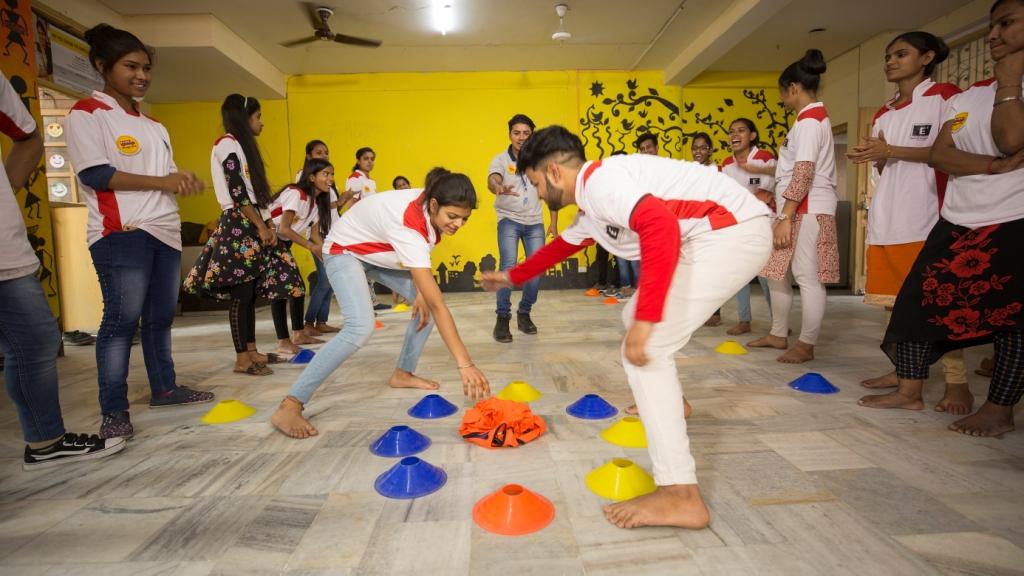 Implementation Strategies
Implementation Strategies
Magic Bus’s Livelihood Programme is designed to prepare young people for the formal employment landscape, focusing on equipping them with transferable life and employability skills. The livelihood curriculum is aligned with International Labour Organisation (ILO) and National Occupational Standards (NOS) framework for 21st-century life and employability skills. The content is delivered by using participatory and experiential learning methods with blended model delivery techniques such as classroom, virtual and self-learning sessions.
Magic Bus is one of the first movers in innovation and upgrading of the skilling curriculum by partnering with various Corporate Social Responsibility brands, employers, and government bodies to support access towards skilling young people and ensuring that it is industry-oriented and relevant to the current job market. Magic Bus has partnered with National Skill Development Corporation (NSDC) to implement the first-ever Skill Impact Bond (SIB) to provide skilling to youths.
The targeted approach involves the mobilisation of youths directly from their communities, offering training, facilitating job placement, and providing ongoing support to ensure job retention. Recognising the need for sustained guidance, the programme incorporates continued mentorship and handholding support, thereby empowering youths with the necessary assistance throughout their transformative journey towards employment and entrepreneurship.
Standard Skilling Programme for undergraduate youths (Two-month duration): The programme is tailored for undergraduate youths and provides sector oriented training in collaboration with employers. It covers life skills, employability skills, sector orientation, and placement, followed by post-placement support.
Connect With Work programme for graduate youths (Boot-camp programme with one-week duration): Specifically designed for graduate youths, the programme addresses challenges faced by first-time job seekers. It aims to skill participants for the modern work environment, connecting them with available jobs in their local areas. The week-long skilling is followed by three months of handholding support.
Digital Skilling Programme for engineering and STEM graduate youths (Three-month duration): Targeting Engineering and BSc (IT) graduates, the programme focuses on cloud computing skills in collaboration with global leaders like Amazon Web Services (AWS) and Microsoft Azure. The three-month curriculum includes scenario-based learning, hands-on labs, and employability skills training, preparing participants for certification exams and entry-level cloud computing roles.
Entrepreneurship Development Programme (One-Year duration): Through this programme, Magic Bus focuses on giving wings to the dreams of aspiring entrepreneurs under the 'Aspiring Entrepreneurs Programme (AEP).' AEP enables young people from underserved communities to start and manage their micro-enterprises, combating unemployment through alternative livelihoods. The programme is run through eight incubation centres across three regions: North - Jaipur and Delhi, South - Mysore, and West - Thane, Bhandara, and Palghar districts. Magic Bus aims to build the youth’s leadership capital, knowledge & skill capital, social capital, and development capital to successfully start and run micro-enterprises.
Success Stories
Sahil Mohite, a 21-year-old from a farming family in Konkan, faced financial struggles growing up. Determined to improve his family's situation, he moved to Mumbai. Unemployed and clueless about the formal workforce, Sahil joined the Magic Bus India Foundation’s Livelihood Programme. Focusing on transferable life and employability skills, proved transformative for Sahil. He overcame challenges, especially in communication, and became a Customer Care Executive at Reliance. Sahil's success exemplifies the impact of skilling programmes in addressing youth employment challenges, showcasing that with perseverance and support, individuals can rewrite their destinies.
Sahil Mohite shared “Magic Bus was a turning point in my life. It is where I found the support and guidance I needed. The exposure visit was an eye-opener. It showed me the reality and helped me understand the Retail sector. I started doing self-study, submitted assignments on time, and actively participated in every session. This programme helped me bridge the gap, transforming my fear into confidence. They not only taught me skills but also groomed me to be presentable. Magic Bus not only changed my life but also my family's.”
In the serene Khardi Village, situated in Shahapur, Thane, unfolds the inspiring journey of Rupali Nipurte. Faced with financial challenges, Rupali received support from the Magic Bus’s Entrepreneurship Development Programme (EDP). Struggling with a modest income, she identified a gap in beauty services and, armed with determination and an Advanced Diploma in beauty services, ventured into entrepreneurship in 2017. Despite initial setbacks, she joined the EDP programme, where she acquired essential business skills, leading to the establishment of Mrunal Beauty Parlour in 2019. With newfound knowledge, Rupali expanded her services, leveraging social media for effective marketing. She diversified her business by incorporating photocopying services and product sales, ensuring a steady income. As her venture thrived, Rupali now dreams of relocating to the main Khardi Market, aiming for further expansion.
Rupali's impact extends beyond her business; she empowered four women in her community with beauty parlour skills, enabling them to become self-employed. Leveraging her tailoring expertise, she also mentored over 20 women in tailoring skills through a local NGO. Rupali's journey epitomises entrepreneurship, securing a brighter future for her family and inspiring self-reliance in women, encouraging them to pursue their dreams.
Impact Metrics
Quantitative data is systematically gathered via an online Management Information System (MIS), drawing insights from field staff across diverse parameters like mobilisation, training, placement, proof of placement evidenced by appointment letters, date of joining, salary, and retention support. This comprehensive dataset undergoes rigorous monthly, quarterly, and yearly analysis, serving as vital evidence for ongoing monitoring and evaluation. The annual data is strategically leveraged to assess the programme's impact on crucial indicators such as youth outreach, placement figures, salary progression, and the positive economic influence on families attributable to successful job placements.
Positive Outcomes
The total outreach of 103,276 individuals in the financial year 2022-23 alone underscores the extensive impact of the programme. The establishment of 95 livelihood centres (until FY 2022-23) across different regions, along with the engagement of 825 colleges signifies the successful collaboration with community and educational institutions to amplify the programme's reach and impact. By guiding the youth towards sustainable and respectable employment opportunities, the programme facilitates a consistent income flow, thereby contributing to the doubling of family earnings.
Notably, a focused effort on gender inclusivity is evident, with outreach to 57,990 girls, constituting 56% for the same period. Among the 95 Livelihood Centres, 26 are designated as all-girls centres. Magic Bus's commitment to enhancing the capacity of young women to make life decisions not only lifts the overall living standards of families from poverty to lower middle class but also encourages a more dignified way of life.
Magic Bus’s Livelihood Programme Journey from 2014-15 to 2022-23
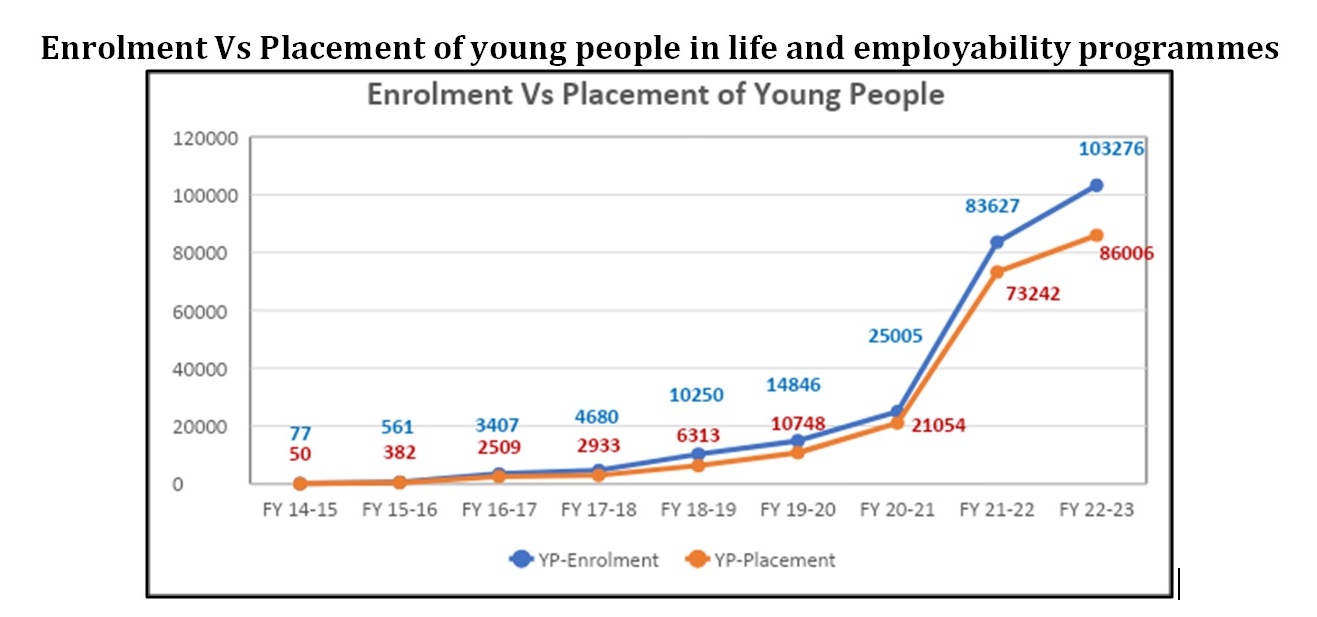
2,03,237 youths have been placed in jobs through the Magic Bus Livelihood Programme as of March 2023.
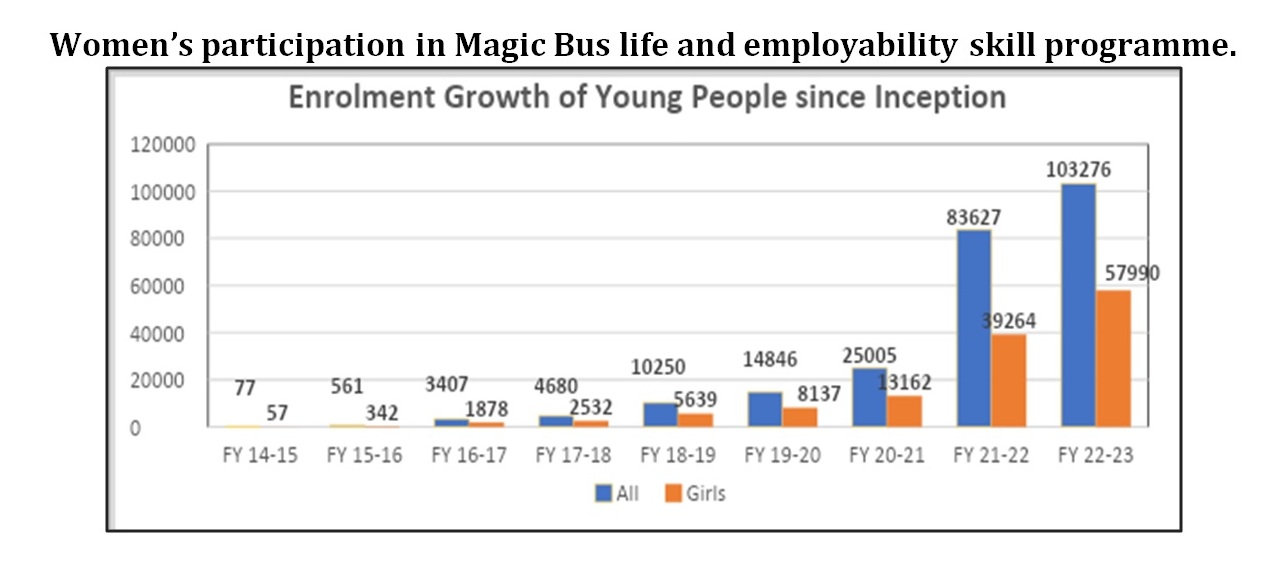
- 56% of young people in the Magic Bus Livelihood programme are women. In Magic Bus, the benchmark of women's participation in all batches is 50%.
- 26 out of 95 Livelihood Centres are all-girls centres.
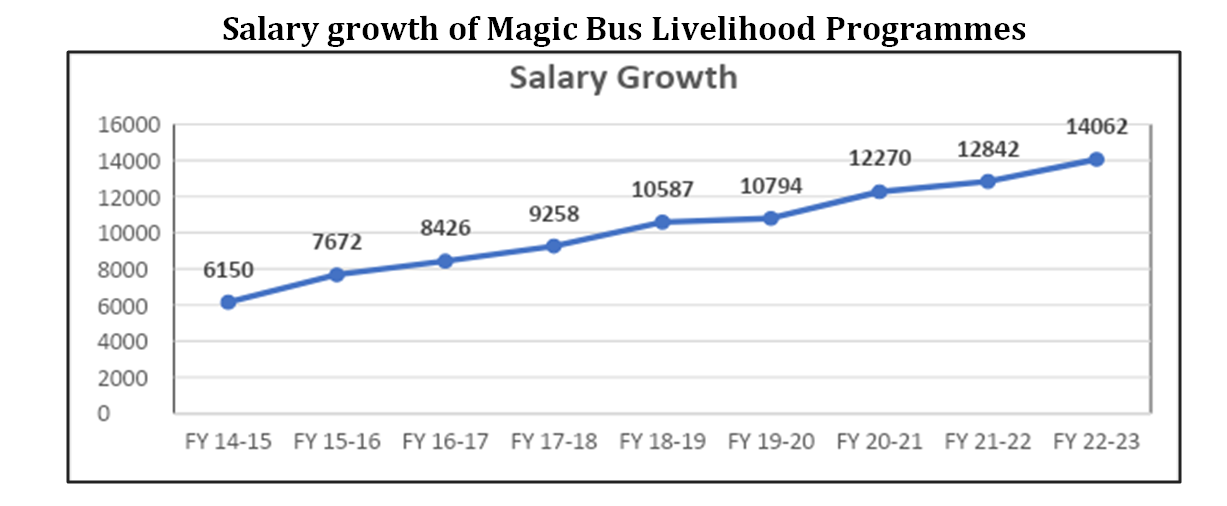
- 70% of young people are placed in sustainable jobs with an average salary of ₹14062 per month
- 99% of young people graduate from Magic Bus’s Livelihood programme
- 65% of young people continue with employment even after 3 months from the date of joining.
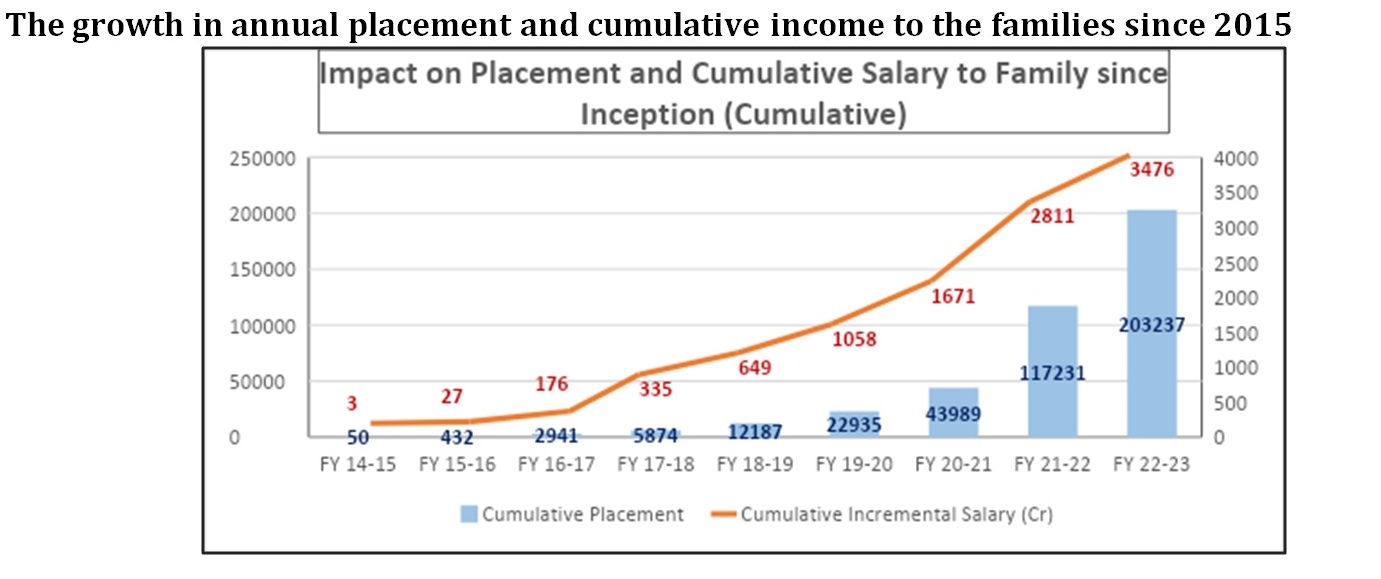
- Average 65% of enrolled youth are continuing in their jobs even after 3 months of handholding support.
- Cumulatively they brought to ₹ 3,476 Crore as their salary to their families and it has resulted as an additional income to the families which is almost equal to their family income thus youths contributing to doubling their family income and eventually helping them to come out of poverty.
- Qualitative data through interaction with alumni saying that a major portion of this income is used for spending on the health of the family members, education of siblings and food items which is ensuring necessary nutrition and health.
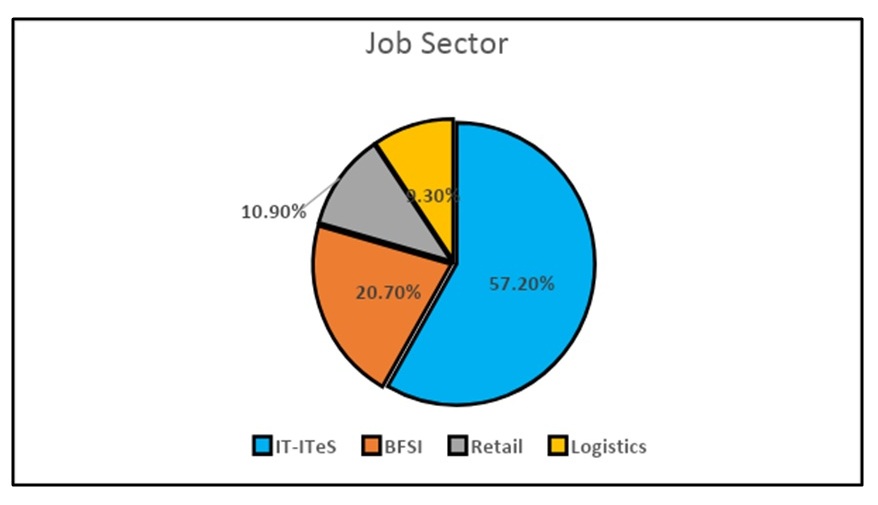
- 57.2% placement in the IT-ITES sector followed by 20.7% in BFSI, 10.9% in Retail, and 9.3% in the logistics sector.
- Social Inclusion: There are 88 young people joined from the LGBTQIA+ section and 348 young people from the people with disability category joined for the skilling programme during FY 2022-23.
Outcomes of Entrepreneurship Development Programme: The programme has a total of 137 graduates who have started their enterprises. The journey of these young aspirants has been groundbreaking. They have demonstrated a true entrepreneurial spirit, showcasing high levels of resilience, innovation, a self-starter attitude, and personal leadership. The entrepreneurs are now becoming job creators, offering employment opportunities to more than 100 local youth. Currently, Magic Bus is working with 300 aspiring young entrepreneurs across North - Jaipur and Delhi, South - Mysore, and West - Thane, Bhandara, and Palghar districts.
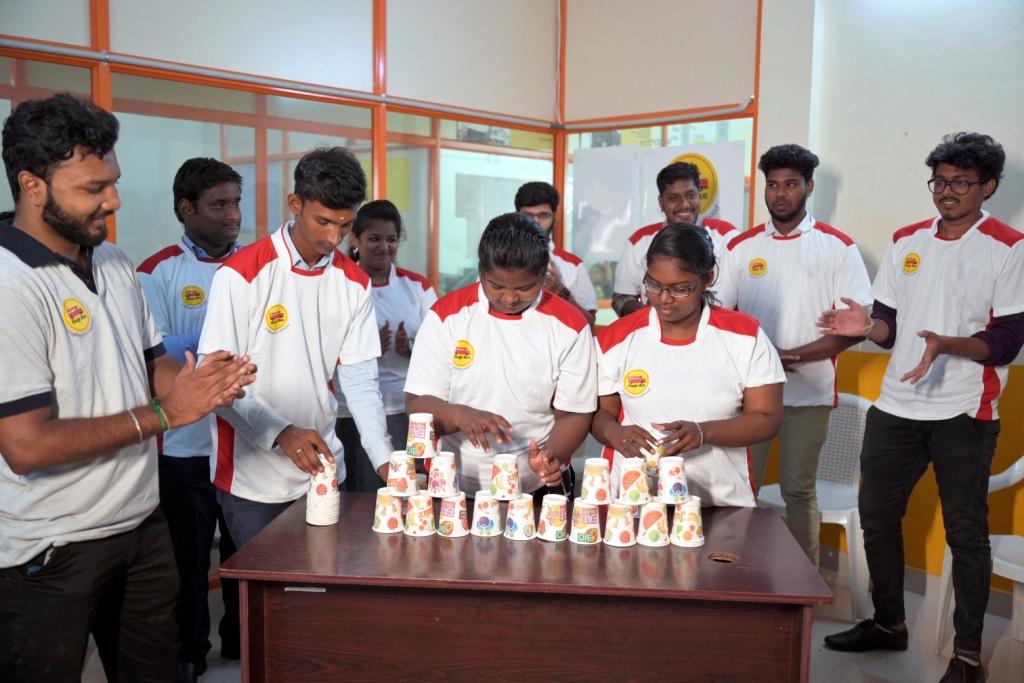 Challenges and Solutions
Challenges and Solutions
- Mobilisation: Encountering difficulty in identifying motivated youth for job placement is a common challenge. Some participants may enroll solely to complete the course. To address this, effective counselling and mobilisation strategies are employed to ensure that individuals with a genuine interest in securing employment are identified.
- Withdrawal of girls just before placement in religious minority communities: A notable challenge arises in certain religious minority communities where girls withdraw from the programme just before placement. To address this issue, a comprehensive door-to-door campaign is conducted, coupled with counselling sessions with parents. The aim is to engage with parents and alleviate concerns, convincing them to support the inclusion of their daughters in the programme until completion.
- Documentation collection: The collection of necessary documentation, particularly obtaining joining letters as proof of placement, poses a challenge as some participants may be hesitant to share such documents. To mitigate this, efforts are directed towards establishing a robust network and collaboration with employers. This strategic approach ensures the authenticity of the documentation and simplifies the process of gathering the required paperwork.
In the ever-evolving landscape of social development, Magic Bus India Foundation constantly adapts its programmes to meet the evolving needs. This adaptability not only showcases the organisation's responsiveness but also emphasises the crucial importance of embracing change, learning valuable lessons from setbacks, and persisting with unwavering determination in the continuous pursuit of a more profound and positive social impact. In the livelihood space, challenges are viewed as opportunities. For instance, the initial difficulty of promptly placing trained youth with reputable employers became an opportunity for the organisation to strengthen its ties with employers. This was achieved by implementing a demand-driven model, wherein one or two employers committed to absorbing 60% of the youth immediately after their training, transforming challenges into avenues for strategic growth and impact.
Scalability and Replication
Magic Bus intends to significantly expand its livelihood programme in the coming years, extending its reach to more urban and semi-urban areas. The goal is to empower over 500,000 youths annually over the next 3-5 years. This scale will be achieved by adopting various technology solutions and implementing blended delivery models with AI chat support for self-learning. The strong connections with a large number of big and medium employers provide a positive context for scaling the programme.
Key Learnings
- Empowering Youth Agency through Transferable Life and Employability Skills: A dynamic curriculum, meticulously aligned with international and national standards, has demonstrated its efficacy in elevating the agency of youth. Emphasising on transferable life and employability skills enable youth to make informed decisions on their life and career trajectories.
- Demand-Driven Batch Formation: To ensure swift placement with reputable employers post-training, a demand-driven model has been introduced. In this model, one or two employers from the same sector commit to absorbing a minimum of 60% of the total youth in a batch. This strategic approach enhances the chances of immediate employment for the participants.
- Job Sustainability through Hand Holding and Mentorship: Recognising the challenges faced by first-time job seekers, the organisation provides a minimum of 3 months of handholding and mentorship to youth upon joining new jobs. This support is instrumental in ensuring job sustainability. It has been observed that when youth receive this assistance and continue in their jobs for at least 3 months, a significant majority of them begin to lay the foundation for their careers and plan for future career growth.
Recognition and Awards
Magic Bus selected as one of the first NGOs and implementation partners of India's inaugural Skill Impact Bond in partnership with National Skill Development Corporation (NSDC)
- Harvard Business School published a case study on Magic Bus’s Childhood to Livelihood programme.
- Best Livelihood Approach Award at ET Now’s World CSR Day Congress and Awards
- Best NGO in the Skill development category for employability enhancement through life skills at the 7th National CSR e-Summit
- Millenium Alliance Award, Round 4, for innovative practices in the Livelihood space
Call to Collective Action
As Magic Bus India Foundation continues to make a meaningful impact on the lives of vulnerable youth, it invites other organisations to join hands in the pursuit of social responsibility and sustainable development. Let us recognise the transformative power of investing in the potential of young people, providing them with the tools they need to thrive. Embracing a commitment to social responsibility not only benefits the immediate communities they serve but also fosters a positive ripple effect that resonates across society.




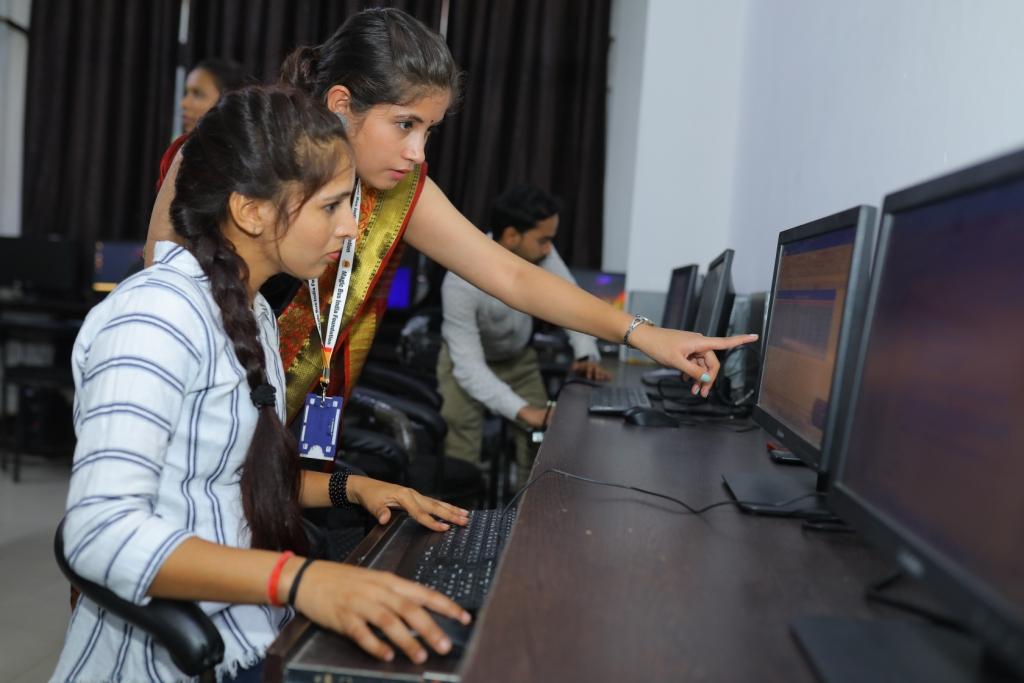
 Magic Bus India Foundation is one of the leading NGOs in the education and skilling space in India. Over 25 years, the organisation has established its presence across 24 states and Union Territories of India. Magic Bus works with young people from underserved communities between the age group of 12 to 25 years, providing them with life skills and employability skills. The NGO offers two distinct life skills programmes – the Adolescent programme and Livelihood Programme.
Magic Bus India Foundation is one of the leading NGOs in the education and skilling space in India. Over 25 years, the organisation has established its presence across 24 states and Union Territories of India. Magic Bus works with young people from underserved communities between the age group of 12 to 25 years, providing them with life skills and employability skills. The NGO offers two distinct life skills programmes – the Adolescent programme and Livelihood Programme. Implementation Strategies
Implementation Strategies




 Challenges and Solutions
Challenges and Solutions 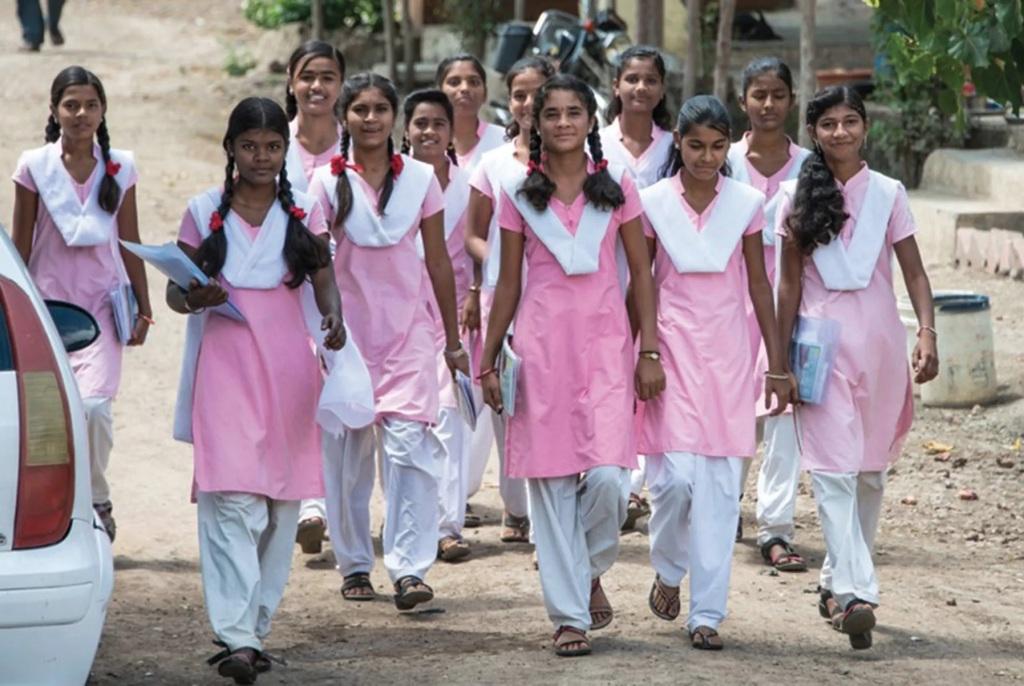


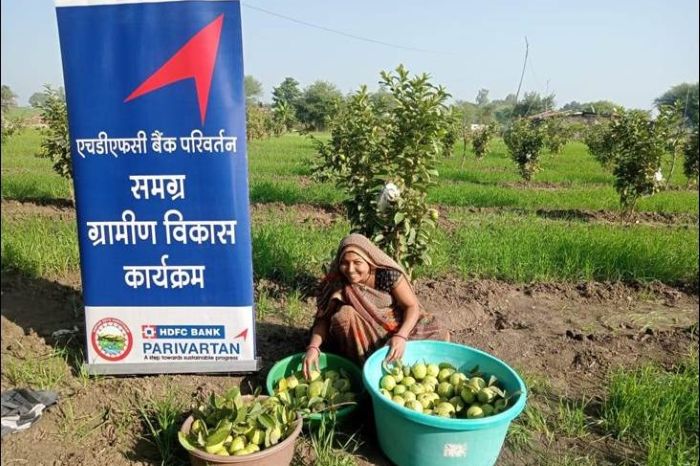
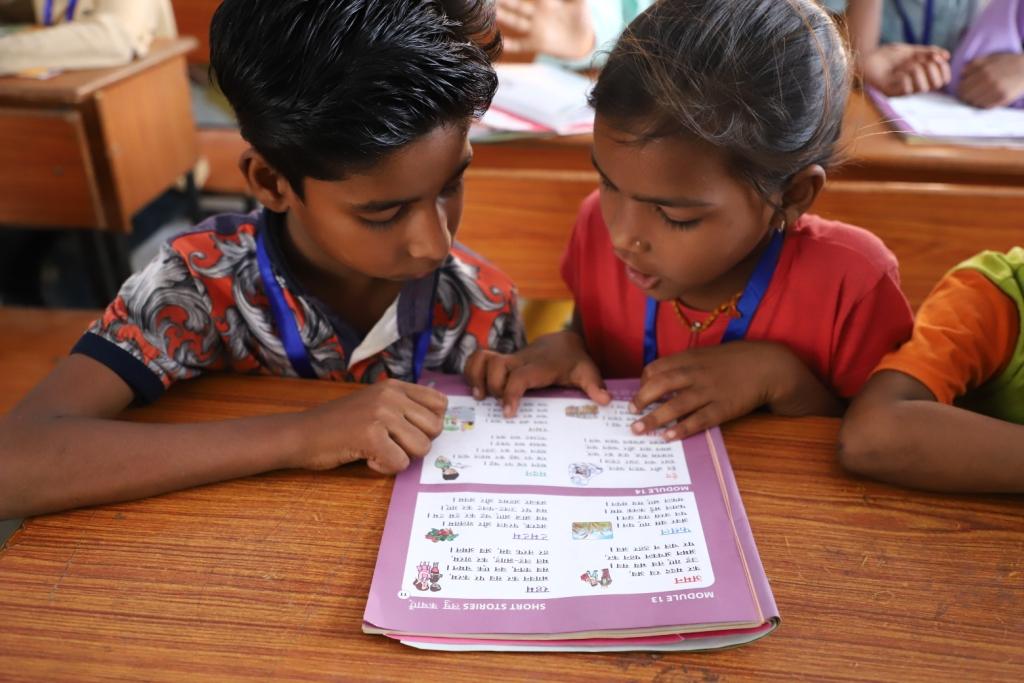
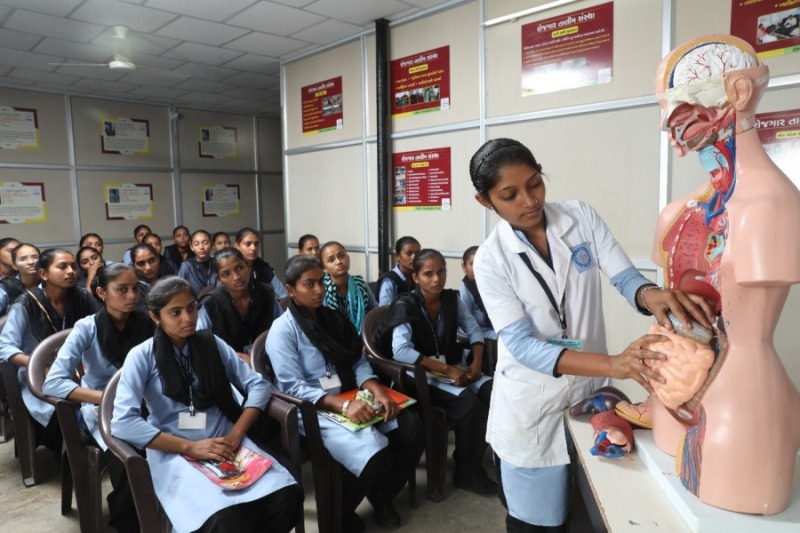

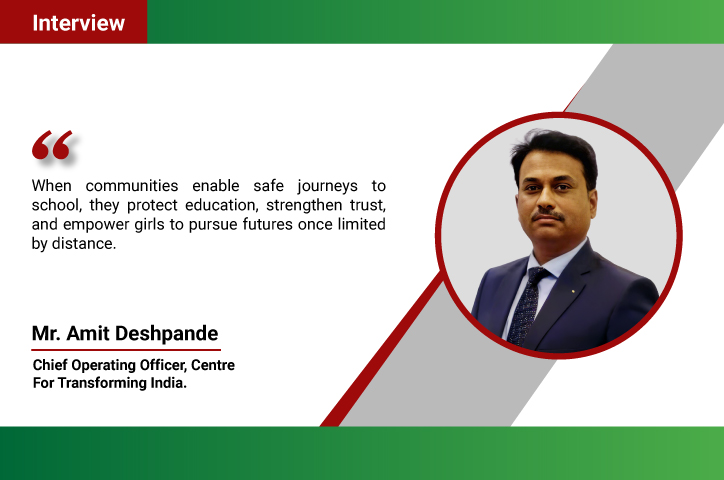
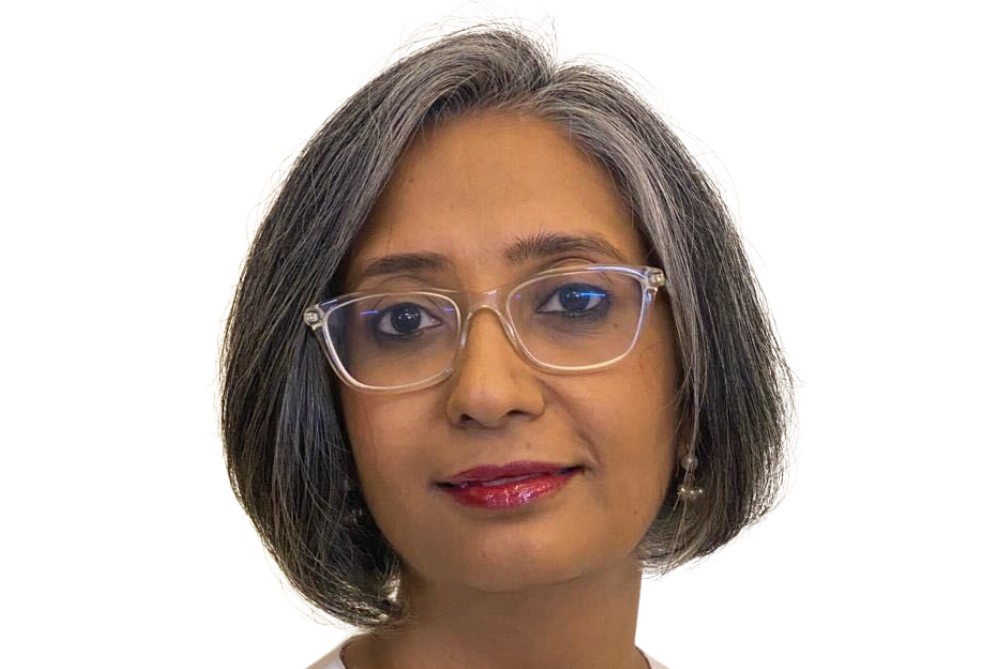





.jpg)



